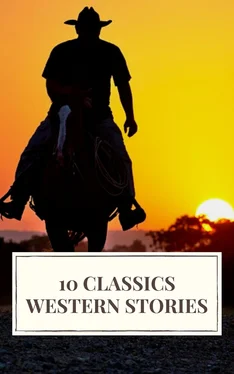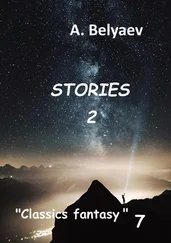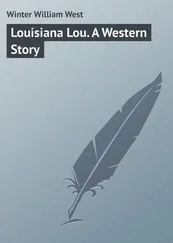The Indian turned and rejoined his comrades at the canoe. They pushed out into the river, but held the boat in the current by an occasional paddle-stroke, and waited listening. Back at the foot of the tree the captive strained every nerve and muscle in one mighty effort to break the cords that bound him; but it was useless, and he lay back with set teeth and rigid muscles, while his eyes sought in vain through their thick covering to see the approach of his foes. Presently a fierce outburst of howls and snarls told the listeners that the wolves had found their prey. They lingered and listened a little longer, but no sound or cry was heard to tell of the last agony under those rending fangs; the chief died in silence. Then the paddles were dipped again in the water, and the canoe glided up the river to the camp.
When they reached the shore they found the rebel’s wife awaiting them in the place where they had left her. She asked no questions; she only came close and looked at their faces in the dusk, and read there the thing she sought to know. Then she went silently away. In a little while the Indian wail for the dead was sounding through the forest.
“What is that?” asked the groups around the camp fires.
“The rebel chief’s wife wailing the death-wail for her husband,” was the low reply; and in that way the tribes knew that the sentence had been carried out. Many bands were there, of many languages, but all knew what that death-wail meant the instant it fell upon their ears. Multnomah heard it as he sat in council with his chiefs, and there was something in it that shook even his iron heart; for all the wilder, more superstitious elements of the Indians thrilled to two things,—the war-cry and the death-wail. He dismissed his chiefs and went to his lodge. On the way he encountered Tohomish, lurking, as was his wont, under the shadow of the trees.
“What think you now, Tohomish, you who love darkness and shadow, what think you? Is not the arm of the Willamette strong? Has it not put down revolt to-day, and held the tribes together?”
The Pine Voice looked at him sorrowfully.
“The vision I told in the council has come back to me again. The cry of woe I heard far off then is nearer now, and the throng on the death-trail passes thicker and swifter. That which covered their faces is lifted, and their faces are the faces of Willamettes, and Multnomah is among them. The time is close at hand.”
“Say this before our enemies, and, strong tomanowos though you are, you die!” said the chief, laying his hand on his tomahawk. But the seer was gone, and Multnomah stood alone among the trees.
Every evening at dusk, the widow of the rebel sachem went out into the woods near the camp and wailed her dead. Every night that wild, desolate lament was lifted and rang through the great encampment,—a cry that was accusation, defiance, and lament; and even Multnomah dared not silence her, for among the Indians a woman lamenting her dead was sacred. So, while Multnomah labored and plotted for union by day, that mournful cry raised the spirit of wrath and rebellion by night. And thus the dead liberator was half avenged.
Part 4 THE LOVE TALE.
Chapter 1 THE INDIAN TOWN.
The bare ground with hoarie mosse bestrowed
Must be their bed, their pillow was unsowed
And the frutes of the forrest was their feast.
The Faërie Queene.
Never before had there come to Cecil so grand an opportunity for disseminating gospel truth. The work of half a lifetime might be done in a few days.
“The tribes are all gathered together in one encampment, and I can talk with them all, tell them of God, of the beauty of heaven and of the only Way. Then, when they disperse, they will carry my teaching in every direction, and so it will be scattered throughout all this wild land.”
This was the thought that came to Cecil when he awoke on the morning after the trial. Now was the time to work! Now was the time for every element of argument, persuasion, and enthusiasm to be exerted to the utmost.
Earnestly did he pray that morning, kneeling in his lodge beside his couch of furs, that God would be with and help him. And as he prayed, warm and glowing was the love and tenderness that filled his heart. When the day was a little more advanced, he entered upon his work. The camp was astir with life; nearly all had finished their morning meal, and the various employments and diversions of the day were begun. Each tribe or band had pitched its lodges apart, though not far from the others. It was not so much an encampment as a group of many encampments, and the whole made up a scattered town of huts and wigwams.
A precarious and uncertain quiet had succeeded the agitation of the day before. Multnomah’s energy had awed the malcontents into temporary submission, and the different bands were mingling freely with one another; though here and there a chief or warrior looked on contemptuously, standing moodily apart, wrapped in his blanket. Now and then when a Willamette passed a group who were talking and gesticulating animatedly they would become silent all at once till the representative of the dreaded race was out of hearing, when a storm of indignant gutterals would burst forth; but there were no other indications of hostility.
Groups were strolling from place to place observing curiously the habits and customs of other tribes; the common Willamette tongue, precursor of the more modern Chinook jargon, furnishing a means of intercourse. Everywhere Cecil found talk, barter, diversion. It was a rude caricature of civilization, the picture of society in its infancy, the rough dramatization of that phase through which every race passes in its evolution from barbarism.
At one place, a hunter from the interior was bartering furs for hiagua shells to a native of the sea-coast. At another, a brave skilled in wood-work had his stock of bows and arrows spread out before him, and an admiring crowd were standing around looking on. But the taciturn brave sat coolly polishing and staining his arrows as if he were totally unconscious of spectators, until the magical word “buy” was mentioned, when he at once awoke to life and drove a bargain in bow and quiver versus dried berries and “ickters” that would have done credit to a Yankee.
At one place sat an old warrior from the upper Columbia, making arrow-heads, chipping off the little scales of flint with infinite patience, literally wearing the stone into the requisite shape. Beside him lay a small pack of flints brought from beyond the mountains, for such stone was rarely found along the lower Columbia. Squaws sat in front of their wigwams sewing mats,—carefully sorting the rushes, putting big ends with little ends, piercing each with a bodkin, and sewing them all together with a long bone needle threaded with buckskin or sinew. Others were weaving that water-tight wickerwork which was, perhaps, the highest art to which the Oregon Indians ever attained. Here a band of Indians were cooking, feasting, laughing, shouting around a huge sturgeon captured the night before. There a circle of gamblers were playing “hand,”—passing a small stick secretly from hand to hand and guessing whose hand contained it,—singing as they played that monotonous “ho-ha, ho-ha, ho-ha,” which was the inseparable accompaniment of dancing, gambling, and horseback riding.
Among them all Cecil moved with the calm dignity he had acquired from long intercourse with the Indians. Wherever he went there was silence and respect, for was he not the great white medicine-man? Gambling circles paused in the swift passage of the stick and the monotone of the chant to look and to comment; buyers and sellers stopped to gaze and to question; children who had been building miniature wigwams of sticks or floating bark canoes in the puddles, ran away at his approach and took shelter in the thickets, watching him with twinkling black eyes.
Читать дальше












